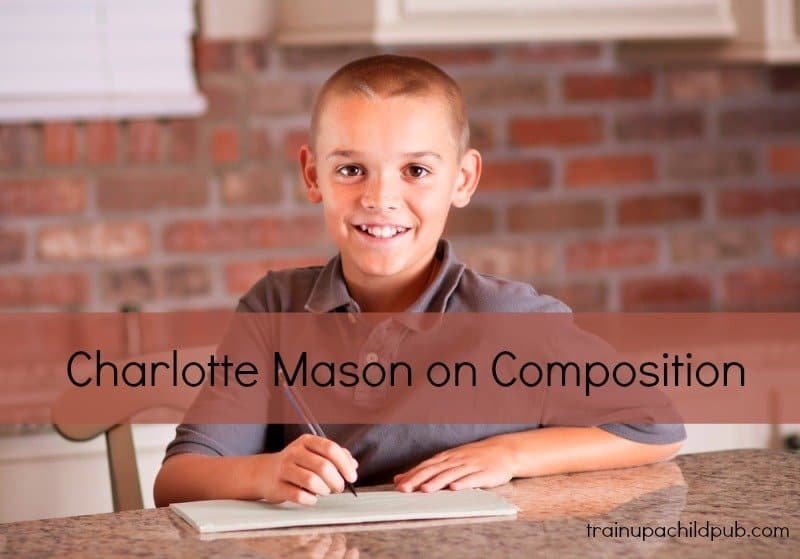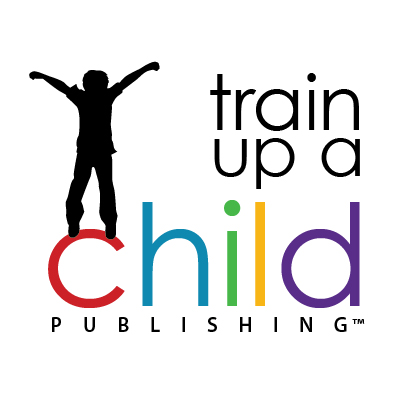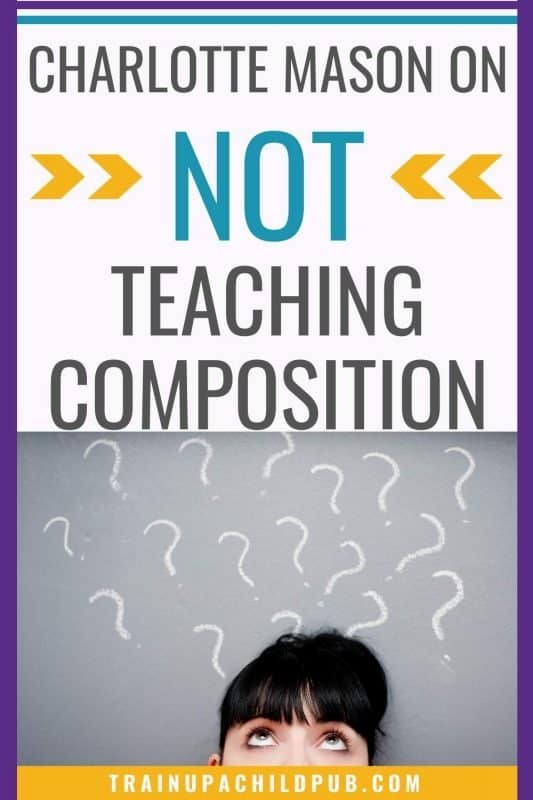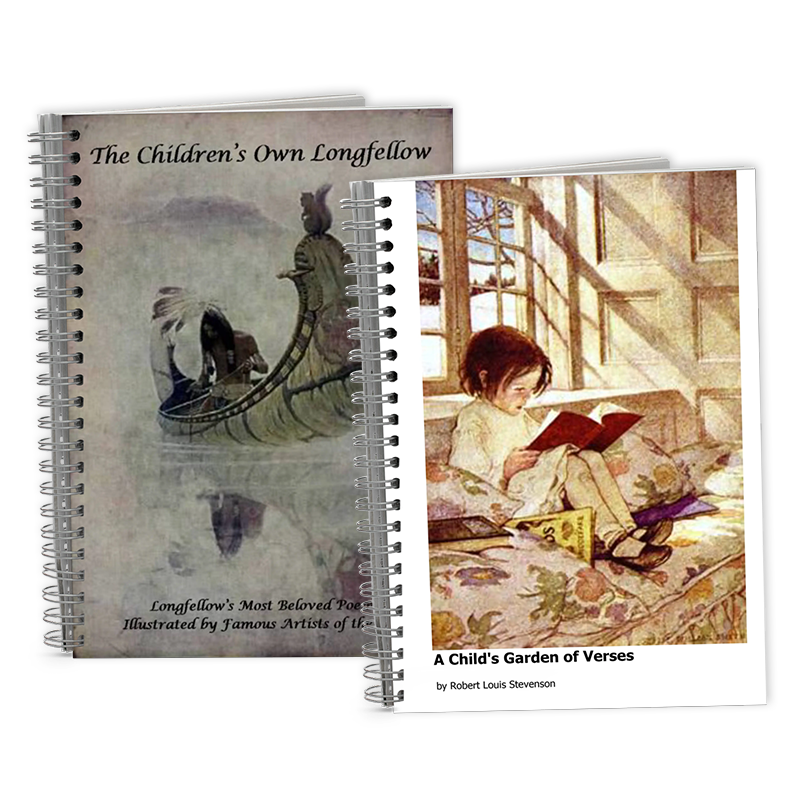Charlotte Mason’s Controversial Method of (Not) Teaching Composition

If there’s one subject that makes homeschooling moms pull their hair out, it’s trying to teach writing to young kids. Are you struggling with this? If so, you’ll want to read what Charlotte Mason said about (not) teaching composition.
One of the things I love about the Charlotte Mason method of teaching is that it doesn’t expect you to spend time trying to teach your children composition before they are developmentally ready for it.
My oldest was a natural writer. She used to make “grocery lists” when she was just a few years old. Of course, they were not really in words. But she was still expressing herself in writing. This is not the norm, especially for boys. (Now you might have a boy that loves writing, but you may be in the minority.)
Unlike my first child, my second child was not interested in writing. At all. We didn’t seriously buckle down teaching writing until late elementary and middle school when he was more ready to tackle it. This child was incredibly creative, but there was something about writing that just didn’t gel for him until later.
You can’t bring your kids’ homeschooling to life if you are spending so much time trying to force them to learn something they aren’t ready for. That doesn’t mean it isn’t good for them to struggle a little to learn something difficult. But if they aren’t ready, they aren’t ready!
So this is what Charlotte Mason said about teaching composition:
Charlotte Mason on Composition
‘Composition’ comes by Nature.––In fact, lessons on ‘composition’ should follow the model of that famous essay on “Snakes in Ireland”––”There are none.” For children under nine, the question of composition resolves itself into that of narration, varied by some such simple exercise as to write a part and narrate a part, or write the whole account of a walk they have taken, a lesson they have studied, or of some simple matter that they know.
Before they are ten, children who have been in the habit of using books will write good, vigorous English with ease and freedom; that is, if they have not been hampered by instructions. It is well for them not even to learn rules for the placing of full stops and capitals until they notice how these things occur in their books. Our business is to provide children with material in their lessons, and leave the handling of such material to themselves. If we would believe it, composition is as natural as jumping and running to children who have been allowed due use of books. They should narrate in the first place, and they will compose, later readily enough; but they should not be taught ‘composition.’
Build a foundation for writing first
If you aren’t familiar with Charlotte Mason’s teaching on composition, it’s pretty controversial. Especially to public educators or even classical homeschoolers. But her methods seemed spot on when I was homeschooling! Instead of trying to teach composition before kids were ready, Charlotte Mason focused on building a strong foundation for writing, instead of trying to teach writing without building the foundation first.
How do you build a foundation for writing?
In (affiliate link) Endangered Minds: Why Children Don’t Think And What We Can Do About It, Dr. Healy describes just how important conversation between parents and children is to developing children’s verbal and language skills. And the more conversation, the better! Even though this book is on the older side, the author really opens your eyes to how crucial parents’ interactions with their young children are!
This is born out in later research:

So reading and talking with our children during those primary years are crucial to their language development and later literacy.
So let’s talk a little more about what Charlotte Mason said about composition.
Charlotte Mason on Composition restated
Did you get that last sentence in her quote? Charlotte Mason said, “they should not be taught composition.” What?! Let’s look again at her thoughts:
- Under the age of nine, don’t teach composition as a subject. Instead of writing reports, children should focus on narration. They can orally narrate or they can write about an experience they’ve had or a subject they’re familiar with. Or, their written narration might be this: they write a sentence or two and dictate the rest while you write it for them.
- Children who have been exposed to the best in literature will automatically be able to express themselves in writing when they are old enough.
- Punctuation (grammar) should be taught using the books they are reading. Instead of with workbooks or textbooks.
- Charlotte Mason intimated here and states more clearly elsewhere: Children are to be exposed to the best in literature and be allowed to “interact” with it themselves. In other words, without us constantly interpreting and explaining it to them.

So when you read excellent literature to your young children and talk to them with grammatically correct sentences instead of baby talk, they’re already absorbing how words fit together and how they are used to tell a story.
As they learn to communicate with parents and siblings, listen to older siblings and parents talk, and listen to people at church and in the neighborhood… your child is developing language skills. During those trips to the park, the grocery store, the beach, and the forest, they are constantly adding colorful vocabulary to their mental “word banks.” And all without one formal writing lesson.
(And don’t miss that in her quote, Charlotte Mason is discussing younger elementary-aged children, not middle school or high school students.)
So how early should we teach writing?
I don’t believe children are to jump right into school and study composition. In fact, in our unstructured Unit Program Tools, we don’t suggest formal composition instruction until nine years old (third grade).
However, in our Daily Lesson Plans we start a little earlier with very simple copywork sentences for those parents whose children are eager to start writing, as my firstborn was. When we include these types of lessons in our Plans, we keep them very brief and always in conjunction with books written at your child’s comprehension level. But we use simple copy work from first grade on in our Daily Lesson Plans and we include basic punctuation and grammar. To see an example of these early lessons, take a look at our 1st Grade Daily Lesson Plans Sample Week.
Do children really learn to write ‘automagically’?
Although in point #2 above, Ms. Mason assumes that children exposed to high-quality literature will automatically be able to write, that hasn’t been my experience for all children. (Either mine or others I’ve taught.) As I said, my oldest was naturally interested and ready for writing instruction earlier than my second.
Some children have definitely been more natural writers than others. And some have benefited by more detailed writing instruction. But not in the first few grades — save it for later elementary, at the earliest.
If they’re supposed to “interact” with the story themselves, should we answer our children’s questions?
We shouldn’t interrupt our read alouds with lots of commentary. But we should answer their questions as they come up during read-aloud time and even in our older kids’ independent reading. Of course, we must always pay close attention to children’s attention span and interest level and not give reams of information that they aren’t ready yet to understand.
So if you’re answering a question or finding yourself giving “a little” background on something and find your children’s eyes glazing over, or they suddenly start to disappear at a read-aloud time, consider that you may be crossing the line and telling them too much. You want your kids to enjoy their read-aloud times and get swept up in their experience of the story. Not to have to listen to too much of your commentary. So answer questions briefly at your children’s level, without using their question as a catalyst for a lecture.
So what do you think about what Charlotte Mason says about (not) teaching composition to your kids? Tell me in the comments!
![]()
P.S. If your student has had some writing instruction in elementary and early middle school and is ready to learn more advanced writing skills, check out our Essay Styles for High School one-semester course! With this course, 8th graders on up will learn how to write the five most common Essays required in high school: narrative, expository, descriptive, persuasive, and comparison-contrast. After taking the course, your student can use this for a reference throughout high school and college.



I’d like to chime in on this one, for the simple fact that I have a 19, an 18 and a 15 year old, all of whom read and write very well. This was not always the case. I saw in my middle child the rough and tumble, video game playing, school hating ways that many of my frustrated friends reported in their boys. At the age of 8, my boy very much disliked reading, let alone sitting studiously while the teacher gave writing instruction. My husband suggested that we make video game playing (a very small dose of 1/2 hour a day) a reward for reading for the same amount of time. This decision marked the long, not always fun task of ensuring this lovely child follow through with his reading… often kicking and screaming. 2 years later I got a call from his grade 4 teacher. “We’d like to put your son in a reading program”. Oh-oh. I thought “well, I guess any kid could have a reading problem, I’ll do what’s necessary”. Turns out that reading program was for gifted readers. My son could read at a grade 12 level. His writing followed suit. He’s been an honour student many times over the years and in his final grade can look forward to doing just about anything he wishes.
In retrospect, I’d agree with the sentiment here. Having to read every day one can not help but pick up the rhythms and patterns of writing.
Yes! If our children read many excellent books, they can’t help but pick up interesting vocabulary, a solid knowledge of grammar, and varied sentence structure. Not that they won’t need to understand it better later… but they will automatically know when sentences don’t “sound right.” Thanks for sharing, Margot.
Ok, so only oral/written narration in elementary. Then on to some writing instruction in middle school – what sort of instruction? using some sort of curriculum? which one? Could someone comment on the specifics of this?
I’d love to relax about this subject, but don’t feel very confident to teach writing. IEW is always raved about but seems very expensive and overwhelming to me. What else is there in the writing world?
Thanks, Dawn
Hi Dawn, thanks for your comment. I understand your insecurity about teaching writing without a solid plan! Our curriculum actually begins gentle writing instruction in third grade through copy work. We begin with understanding words and how they are used to express complete thoughts – i.e., learning how to write complete, interesting sentences. Our writing instruction is similar to IEW in that we teach writing using already published writing, but our method allows for students to develop their own writing ‘voice’ and is less formulaic (and expensive) than IEW. I’m certainly not knocking IEW and realize that it has helped many students, but like any writing program, it has its limitations. Our instruction is based on copy work as well as LOTS of conversation about writing during those earlier years, for example: “Notice the expressive words this author uses!” “Let’s find the verbs in this paragraph.” “Do you see pictures in your mind as you read the author’s description of ___?” This is a very natural method of learning writing and is not stressful for the teacher or the student, as it is very gradual. You might look at our lesson plans samples on our website for ideas. Feel free to contact me using the contact form at the top of this page if you have any other questions.
We started CMs methods later in our school but I naturally avoided most writing programs with my boys just because I am a poor writing teacher. At least I was a poor writing teacher until middle school when we started IEW slowly over the course of three years. Now in high school my boys are confident writers and much of what I see is built up from lots of great literature, varied ideas, and lots of lots of oral/written narration CM style.
I am firmly in line with Charlotte Mason and her ideas of waiting for formal writing until middle school.
Thanks for putting together this post and sharing it with the CM Carnival.
You’re welcome, Barb. Thanks for sharing what has worked with your boys! I’m looking forward to reading your post on the carnival as well!
I agree with you that some children are more natural at writing than others. I love Charlotte Mason and am in agreement that composition ought not to be taught in those early years. If you don’t consider reading aloud great literature and narration of the same ‘instruction.’ We have been CMers from the beginning with my boys 11 & 10. That said, I continue to learn how to educate! But I will add that I have followed CM’s advice, and yet they are not excellent writers. Now, who’s to blame? I don’t know. They have rich vocabularies, creative minds and can put together some captivating stories. But they are not good writers. yet. We shall see. Given time, I fully think that with a little direction they both will be able to craft some fine compositions. Thanks for this thought provoking post 🙂
amy in peru
http://fisheracademy.blogspot.com
Thank you, Amy, for visiting and taking the time to comment. Your boys are still pretty young, but with the wealth of good literature I am sure you have exposed them to, I am sure they will eventually be good writers. I believe writing is a skill that is learned over time with instruction and lots of practice. (But with short lessons and short assignments, of course.)
Hey! I just focused on the ‘Peru’ part of your signature. I will have to check out your blog and see what you do there. My college-aged daughter spent some time last summer participating in a storying conference with the Yagua people in the jungle, so we have prayed a lot for Peru.
Please come back and visit again soon!
I think this goes along with the “better late than early” mentality. That is, when children are ready to learn something (developmentally or emotionally) they will learn it easily and quickly. But that foundation of lots of quality literature really needs to be there. A diet of video games and TV will not naturally foster a good writer. Mom (or Dad) has to read to the children. (Audio books are another option for extra literature.)
At a homeschooling conference a mom was asking for help with her seven year old who was struggling to complete his two weekly writing assignments. She didn’t call them essays, but they were multi-paragraph compositions. WHAT? I was aghast. I tried to reassure here that the assignments were not realistic or necessary. But she seemed reluctant to move away from the curriculum’s specific plan. Poor thing, and poor child.
Jimmie, that is very sad for that poor little guy to have to struggle with multi-paragraph assignments at age seven!!
I don’t care what curriculum you are using, ladies, please don’t feel as though you need to be a slave to it! Make it fit YOUR children and YOUR family, rather than the other way around. I hope this mom hears advice from other circles that coincides with yours, Jimmie, so that she will lighten up! Thanks for your comment.
LOVE THIS Dana. Thank you so much!! You have eased my mind on this subject. I, like others, I’m sure, are constantly second guessing our choices not to incorporate something into our home school that the public or private schools are doing. What a blessing your posts are!
In Him,
Lori
Thank you, Lori! You are so right. It is in our nature to compare what our kids are doing to what (we think) everyone else is doing. I’m so happy to have been an encouragement to you. Thanks so much for your comment!